
 by the same author Player Piano The Sirens of Titan Canary in a Cathouse Mother Night Cat's Cradle God Bless You, Mr Rosewater Welcome to the Monkey House Slaugtherhouse-Five Happy Birthday, Wanda June Breakfast of Champions Wampeter Foma & Granfalloons
by the same author Player Piano The Sirens of Titan Canary in a Cathouse Mother Night Cat's Cradle God Bless You, Mr Rosewater Welcome to the Monkey House Slaugtherhouse-Five Happy Birthday, Wanda June Breakfast of Champions Wampeter Foma & Granfalloons 
 First published in Great Britain 1976 Copyright 1976 by Kurt Vonnegut Jonathan Cape Ltd, 30 Bedford Square, London WC1 Grateful acknowledgment is extended to Al Hirschfield, Who is represented exclusively by The Margo Feiden Galleries, New York City, for permission to reproduce the illustration On the dedication page. British Library Cataloguing in Publication Data Vonnegut, Kurt Slapstick, or Lonesome no more? ISBN 0-224-01432-4 1. Title 823'.9'1F PS3752.05 Printed in Great Britain by litho by The Anchor Press Ltd And bound by Wm Brendon & Son Ltd Both of Tiptree, Essex "Call me but love, and I'll be new baptiz'd... " ROMEO
First published in Great Britain 1976 Copyright 1976 by Kurt Vonnegut Jonathan Cape Ltd, 30 Bedford Square, London WC1 Grateful acknowledgment is extended to Al Hirschfield, Who is represented exclusively by The Margo Feiden Galleries, New York City, for permission to reproduce the illustration On the dedication page. British Library Cataloguing in Publication Data Vonnegut, Kurt Slapstick, or Lonesome no more? ISBN 0-224-01432-4 1. Title 823'.9'1F PS3752.05 Printed in Great Britain by litho by The Anchor Press Ltd And bound by Wm Brendon & Son Ltd Both of Tiptree, Essex "Call me but love, and I'll be new baptiz'd... " ROMEO 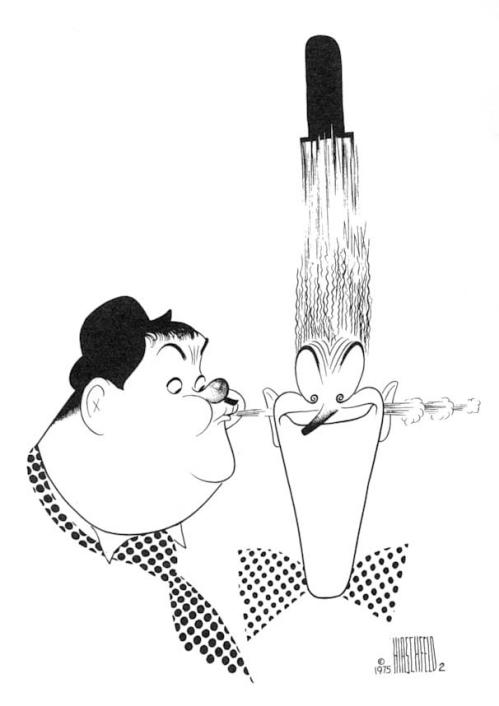 Dedicated to the memory ofArthur Stanley Jefferson and Norvell Hardytwo angels of my time.
Dedicated to the memory ofArthur Stanley Jefferson and Norvell Hardytwo angels of my time.


Prologue
THIS is the closest I will ever come to writing an autobiography. I have called it "Slapstick" because it is grotesque, situational poetry like the slapstick film comedies, especially those of Laurel and Hardy, of long ago. It is about what life
feels like to me.
There are all these tests of my limited agility and intelligence. They go on and on. The fundamental joke with Laurel and Hardy, it seems to me, was that they did their best with every test. They never failed to bargain in good faith with their destinies, and were screamingly adorable and funny on that account. There was very little love in their films. There was often the situational poetry of marriage, which was something else again.
It was yet another test with comical possibilities, provided that everybody submitted to it in good faith. Love was never at issue. And, perhaps because I was so perpetually intoxicated and instructed by Laurel and Hardy during my childhood in the Great Depression, I find it natural to discuss life 
 without ever mentioning love. It does not seem important to me. What does seem important? Bargaining in good faith with destiny. I have had some experiences with love, or think I have, anyway, although the ones I have liked best could easily be described as "common decency." I treated somebody well for a little while, or maybe even for a tremendously long time, and that person treated me well in turn.
without ever mentioning love. It does not seem important to me. What does seem important? Bargaining in good faith with destiny. I have had some experiences with love, or think I have, anyway, although the ones I have liked best could easily be described as "common decency." I treated somebody well for a little while, or maybe even for a tremendously long time, and that person treated me well in turn.
Love need not have had anything to do with it. Also: I cannot distinguish between the love I have for people and the love I have for dogs. When a child, and not watching comedians on film or listening to comedians on the radio, I used to spend a lot of time rolling around on rugs with uncritically affectionate dogs we had. And I still do a lot of that. The dogs become tired and confused and embarrassed long before I do. Hi ho. Hi ho.
One time, on his twenty-first birthday, one of my three adopted sons, who was about to leave for the Peace Corps in the Amazon Rain Forest, said to me, "You know you've never hugged me." So I hugged him. We hugged each other. It was very nice. It was like rolling around on a rug with a Great Dane we used to have. Love is where you find it. I think it is foolish to go looking for it, and I think it can often be poisonous.
I wish that people who are conventionally supposed to love each other would say to each other, when they fight, "Please a little less love, and a little more common decency."



My longest experience with common decency, surely, has been with my older brother, my only brother, Bernard, who is an atmospheric scientist in the State University of New York at Albany. He is a widower, raising two young sons all by himself. He does it well. He has three grownup sons besides. We were given very different sorts of minds at birth. Bernard could never be a writer.
I could never be a scientist. And, since we make our livings with our minds, we tend to think of them as gadgets separate from our awarenesses, from our central selves. We have hugged each other maybe three or four times on birthdays, very likely, and clumsily. We have never hugged in moments of grief. The minds we have been given enjoy the same sorts of jokes, at any rate Mark Twain stuff, Laurel and Hardy stuff. They are equally disorderly, too.
Here is an anecdote about my brother, which, with minor variations, could be told truthfully about me: Bernard worked for the General Electric Research Laboratory in Schenectady, New York, for a while, where he discovered that silver iodide could precipitate certain sorts of clouds as snow or rain. His laboratory was a sensational mess, however, where a clumsy stranger could die in a thousand different ways, depending on where he stumbled. The company had a safety officer who nearly swooned when he saw this jungle of deadfalls and snares and hair-trigger booby traps. He bawled out my brother. My brother said this to him, tapping his own forehead with his fingertips: "If you think this laboratory is bad, you should see what it's like in here." And so on. "You're lucky," he said. "I always lose whatever I'm working on." We laughed. "I always lose whatever I'm working on." We laughed.
But, because of the sorts of minds we were given at birth, and in spite of their disorderliness, Bernard and I belong to artificial extended families which allow us to claim relatives all over the world. He is a brother to scientists everywhere. I am a brother to writers everywhere. This is amusing and comforting to both of us. It is nice. It is lucky, too, for human beings need all the relatives they can get as possible donors or receivers not necessarily of love, but of common decency.
When we were children in Indianapolis, Indiana, it appeared that we would always have an extended family of genuine relatives there. Our parents and grandparents, after all, had grown up there with shoals of siblings and cousins and uncles and aunts. Yes, and their relatives were all cultivated and gentle and prosperous, and spoke German and English gracefully. They were all religious skeptics, by the way. They might roam the wide world over when they were young, and often have wonderful adventures. But they were all told sooner or later that it was time for them to come home to 

Next page

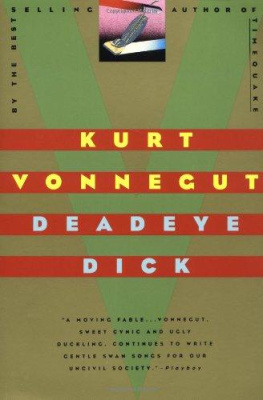
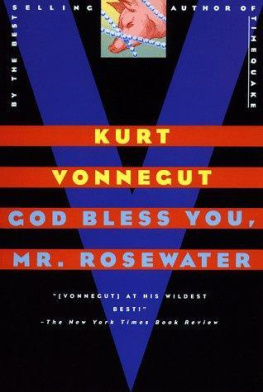
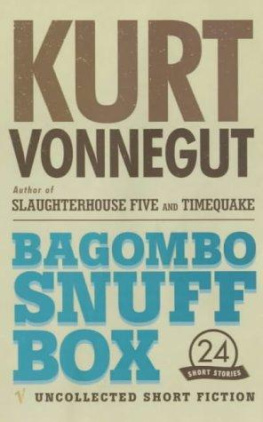
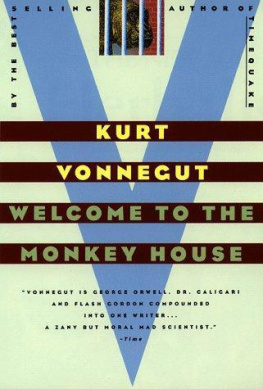


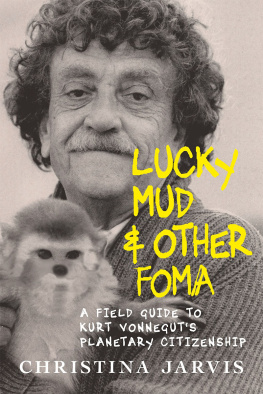


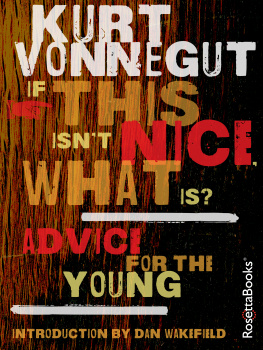

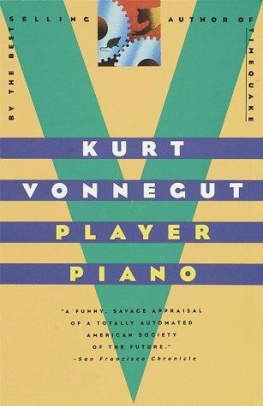
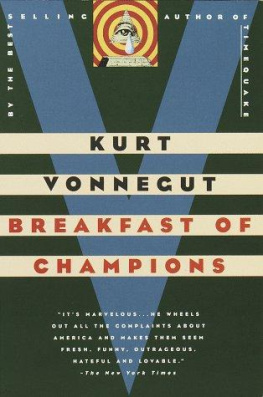

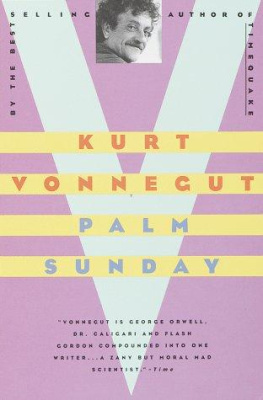

 by the same author Player Piano The Sirens of Titan Canary in a Cathouse Mother Night Cat's Cradle God Bless You, Mr Rosewater Welcome to the Monkey House Slaugtherhouse-Five Happy Birthday, Wanda June Breakfast of Champions Wampeter Foma & Granfalloons
by the same author Player Piano The Sirens of Titan Canary in a Cathouse Mother Night Cat's Cradle God Bless You, Mr Rosewater Welcome to the Monkey House Slaugtherhouse-Five Happy Birthday, Wanda June Breakfast of Champions Wampeter Foma & Granfalloons 
 First published in Great Britain 1976 Copyright 1976 by Kurt Vonnegut Jonathan Cape Ltd, 30 Bedford Square, London WC1 Grateful acknowledgment is extended to Al Hirschfield, Who is represented exclusively by The Margo Feiden Galleries, New York City, for permission to reproduce the illustration On the dedication page. British Library Cataloguing in Publication Data Vonnegut, Kurt Slapstick, or Lonesome no more? ISBN 0-224-01432-4 1. Title 823'.9'1F PS3752.05 Printed in Great Britain by litho by The Anchor Press Ltd And bound by Wm Brendon & Son Ltd Both of Tiptree, Essex "Call me but love, and I'll be new baptiz'd... " ROMEO
First published in Great Britain 1976 Copyright 1976 by Kurt Vonnegut Jonathan Cape Ltd, 30 Bedford Square, London WC1 Grateful acknowledgment is extended to Al Hirschfield, Who is represented exclusively by The Margo Feiden Galleries, New York City, for permission to reproduce the illustration On the dedication page. British Library Cataloguing in Publication Data Vonnegut, Kurt Slapstick, or Lonesome no more? ISBN 0-224-01432-4 1. Title 823'.9'1F PS3752.05 Printed in Great Britain by litho by The Anchor Press Ltd And bound by Wm Brendon & Son Ltd Both of Tiptree, Essex "Call me but love, and I'll be new baptiz'd... " ROMEO  Dedicated to the memory ofArthur Stanley Jefferson and Norvell Hardytwo angels of my time.
Dedicated to the memory ofArthur Stanley Jefferson and Norvell Hardytwo angels of my time.



 without ever mentioning love. It does not seem important to me. What does seem important? Bargaining in good faith with destiny. I have had some experiences with love, or think I have, anyway, although the ones I have liked best could easily be described as "common decency." I treated somebody well for a little while, or maybe even for a tremendously long time, and that person treated me well in turn.
without ever mentioning love. It does not seem important to me. What does seem important? Bargaining in good faith with destiny. I have had some experiences with love, or think I have, anyway, although the ones I have liked best could easily be described as "common decency." I treated somebody well for a little while, or maybe even for a tremendously long time, and that person treated me well in turn.

 My longest experience with common decency, surely, has been with my older brother, my only brother, Bernard, who is an atmospheric scientist in the State University of New York at Albany. He is a widower, raising two young sons all by himself. He does it well. He has three grownup sons besides. We were given very different sorts of minds at birth. Bernard could never be a writer.
My longest experience with common decency, surely, has been with my older brother, my only brother, Bernard, who is an atmospheric scientist in the State University of New York at Albany. He is a widower, raising two young sons all by himself. He does it well. He has three grownup sons besides. We were given very different sorts of minds at birth. Bernard could never be a writer. 
